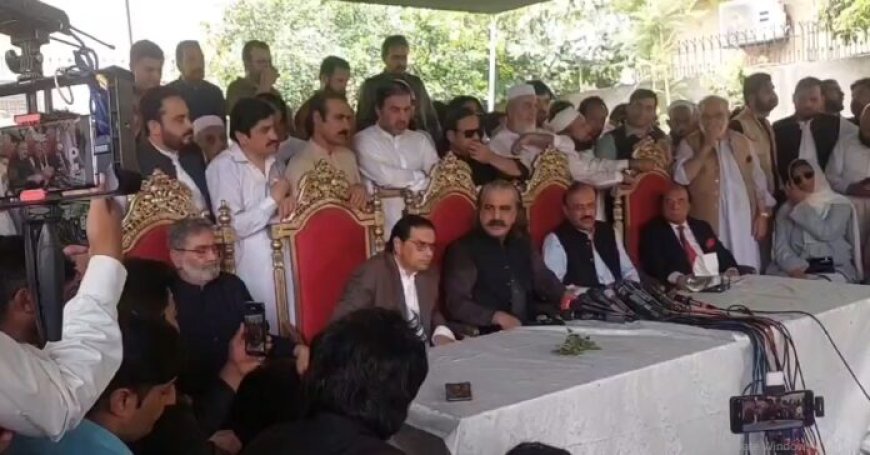PTI Launches 90-Day Anti-Govt Campaign with ‘Do or Die’ Slogan
PTI kicks off 90-day protest for Imran Khan’s release; Gandapur says talks only with 'decision makers' as party faces visible leadership rift.

The political climate in Pakistan has heated up once again as the Pakistan Tehreek-e-Insaf (PTI) announced the launch of a 90-day nationwide anti-government campaign, demanding the immediate release of the party’s founder and former Prime Minister Imran Khan. Framed as a “do or die” movement, PTI leaders have declared that the campaign will shape the party’s political future and the country’s democratic landscape.
The announcement was made during a press conference in Lahore, led by Khyber Pakhtunkhwa Chief Minister Ali Ameen Gandapur, alongside senior PTI figures. While the campaign seeks to energize supporters, the event also exposed signs of growing disunity within PTI’s Punjab leadership—most notably with the absence of PTI Punjab chief organizer Aliya Hamza.
PTI’s 90-Day Campaign: Objectives and Timeline
At the press conference, Gandapur outlined the campaign’s goals and strategy:
-
Core Demand: The unconditional release of Imran Khan.
-
Duration: A 90-day campaign culminating on August 5, 2025, when PTI plans to escalate with a new phase of protests.
-
Theme: Framed as a fight for democracy, justice, and political survival.
Gandapur stressed that PTI is not opposed to negotiations but would “only talk to the real decision-makers.” The statement is widely interpreted as a signal that PTI wants direct talks with the establishment rather than with the ruling coalition.
Legal and Political Grievances
The PTI leadership used the press conference to highlight what it described as systematic injustices against its members and workers.
-
Court Cases: PTI leaders accused the judiciary of deliberately delaying cases involving Imran Khan and party activists.
-
May 9 Crackdown: Gandapur condemned the arrests and alleged human rights abuses of PTI supporters following the May 9, 2023 riots.
-
Election Interference: He accused the establishment of engineering PTI’s ouster through “fake elections and backdoor deals.”
Gandapur also took aim at state institutions, claiming they had “abandoned constitutional responsibilities” and silenced political dissent.
Leadership Rifts Exposed
What was intended to be a show of unity quickly turned into a spotlight on internal divisions. The absence of Aliya Hamza, PTI’s Punjab organizer, sparked controversy.
-
Party General Secretary Salman Akram Raja attempted to downplay the matter, saying she was unavailable due to “other commitments.”
-
Aliya Hamza, however, posted a sarcastic response on social media, suggesting she was never consulted on the campaign plan.
-
Other Punjab leaders also claimed they were not informed about the Lahore convention, fueling speculation of a disconnect between PTI’s central and provincial leadership.
The controversy has raised questions about PTI’s decision-making process and whether the party can maintain cohesion during a critical political battle.
Gandapur’s Fiery Remarks
Throughout the press conference, Gandapur remained unapologetically aggressive in his tone.
-
He accused the government of running a “fascist regime” and vowed to reclaim democratic space through protest.
-
In a personal jab at JUI-F chief Maulana Fazlur Rehman, he challenged him to contest elections against his brother in Dera Ismail Khan, adding that he would resign from politics if defeated.
Such remarks highlight PTI’s continued confrontational stance toward both the government and political opponents.
Failed Negotiations and the Road Ahead
The 90-day campaign follows months of failed talks between PTI and the ruling coalition over:
-
The formation of a judicial commission to investigate the May 9 riots.
-
Probes into the November 2024 Islamabad protests, which PTI claims were mishandled by state forces.
Since Imran Khan’s removal via a no-confidence vote in 2022, PTI has consistently accused the Pakistan Democratic Movement (PDM) government and allied institutions of suppressing democracy. The campaign is seen as the latest step in PTI’s resistance strategy, aimed at mobilizing public sentiment and keeping political pressure on the ruling coalition.
PTI’s Message: “Unity Despite Differences”
While divisions were evident, Salman Akram Raja attempted to project strength and solidarity:
“This is not just about Imran Khan’s freedom. This is about reclaiming the soul of this nation and its institutions.”
Raja accused “outside forces” of amplifying the narrative of PTI disunity, insisting the party remained united under its broader mission.
Public and Political Reactions
The launch of the campaign has drawn mixed reactions:
-
Supporters see it as a necessary push to free Imran Khan and restore PTI’s political influence.
-
Critics argue that PTI is prioritizing confrontation over constructive dialogue, which could worsen instability.
-
Analysts suggest that the campaign’s success will depend on whether PTI can mobilize mass street power while keeping internal rifts under control.
Conclusion: PTI at a Crossroads
The 90-day anti-government campaign launched by PTI has all the elements of a high-stakes political showdown. While it energizes PTI’s base with promises of protest and defiance, the campaign also highlights the fragile unity within the party, especially in Punjab.
Imran Khan’s incarceration remains the central rallying point, but the visible cracks in PTI’s organizational structure raise doubts about how effectively the campaign will unfold.
As August 5 approaches—the declared climax of the campaign—Pakistan’s political landscape is bracing for intensified street protests, confrontations, and renewed calls for dialogue. The coming months will determine whether PTI’s “do or die” strategy revitalizes its political fortunes or deepens its internal fractures.

 Israr Ahmed
Israr Ahmed